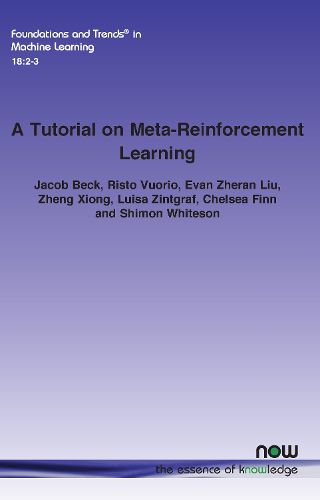Readings Newsletter
Become a Readings Member to make your shopping experience even easier.
Sign in or sign up for free!
You’re not far away from qualifying for FREE standard shipping within Australia
You’ve qualified for FREE standard shipping within Australia
The cart is loading…






This title is printed to order. This book may have been self-published. If so, we cannot guarantee the quality of the content. In the main most books will have gone through the editing process however some may not. We therefore suggest that you be aware of this before ordering this book. If in doubt check either the author or publisher’s details as we are unable to accept any returns unless they are faulty. Please contact us if you have any questions.
While deep reinforcement learning (RL) has fueled multiple high-profile successes in machine learning, it is held back from more widespread adoption by its often poor data efficiency and the limited generality of the policies it produces. A promising approach for alleviating these limitations is to cast the development of better RL algorithms as a machine learning problem itself in a process called meta-RL. Meta-RL considers a family of machine learning (ML) methods that learn to reinforcement learn. That is, meta-RL methods use sample-inefficient ML to learn sample-efficient RL algorithms, or components thereof. Meta-RL is most commonly studied in a problem setting where, given a distribution of tasks, the goal is to learn a policy that is capable of adapting to any new task from the task distribution with as little data as possible.
In this monograph, the meta-RL problem setting is described in detail as well as its major variations. At a high level the book discusses how meta-RL research can be clustered based on the presence of a task distribution and the learning budget available for each individual task. Using these clusters, the meta-RL algorithms and applications are surveyed. The monograph concludes by presenting the open problems on the path to making meta-RL part of the standard toolbox for a deep RL practitioner.
$9.00 standard shipping within Australia
FREE standard shipping within Australia for orders over $100.00
Express & International shipping calculated at checkout
This title is printed to order. This book may have been self-published. If so, we cannot guarantee the quality of the content. In the main most books will have gone through the editing process however some may not. We therefore suggest that you be aware of this before ordering this book. If in doubt check either the author or publisher’s details as we are unable to accept any returns unless they are faulty. Please contact us if you have any questions.
While deep reinforcement learning (RL) has fueled multiple high-profile successes in machine learning, it is held back from more widespread adoption by its often poor data efficiency and the limited generality of the policies it produces. A promising approach for alleviating these limitations is to cast the development of better RL algorithms as a machine learning problem itself in a process called meta-RL. Meta-RL considers a family of machine learning (ML) methods that learn to reinforcement learn. That is, meta-RL methods use sample-inefficient ML to learn sample-efficient RL algorithms, or components thereof. Meta-RL is most commonly studied in a problem setting where, given a distribution of tasks, the goal is to learn a policy that is capable of adapting to any new task from the task distribution with as little data as possible.
In this monograph, the meta-RL problem setting is described in detail as well as its major variations. At a high level the book discusses how meta-RL research can be clustered based on the presence of a task distribution and the learning budget available for each individual task. Using these clusters, the meta-RL algorithms and applications are surveyed. The monograph concludes by presenting the open problems on the path to making meta-RL part of the standard toolbox for a deep RL practitioner.